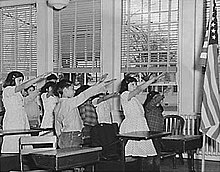The dates I provided for the 'official' adoption of the Pledge of Allegiance were from memory. Those posted on the site linked below are a few years different:
Congress officially recognized the Pledge of Allegiance in 1942, but in 1943, the Supreme Court ruled that public school students could not be forced to recite it.
The words "under God" were added in 1954 by then President Eisenhower, who stated at the time, "In this way we are reaffirming the transcendence of religious faith in America's heritage and future; in this way we shall constantly strengthen those spiritual weapons which forever will be our country's most powerful resource in peace and war."
Brief history of the Pledge of Allegiance
And from the ReligiousTolerance site who I have caught in some factual errors and are not above presenting their information with some bias, but who usually do a better-than-average job in their research:
. . .its original form, it read:
"I pledge allegiance to my Flag and the Republic for which it stands, one nation, indivisible, with liberty and justice for all."
It was first published in a children's magazine Youth's Companion, in 1892 to celebrate the 400th anniversary of Columbus' arrival in the Americas. 4 The word "to" was added before "the Republic" in 1892-OCT. He considered including the word "equality" in the pledge, but decided against it because he knew that many Americans at the time were opposed to equality for women and African-Americans. Opposition to equality continues today; a sizeable minority of American adults remain opposed to equal rights for women, gays and lesbians, and transsexuals.
By 1924, the "National Flag Conference, under the leadership of the American Legion and the Daughters of the American Revolution, changed the Pledge's words, 'my Flag,' to 'the Flag of the United States of America.' Francis Bellamy disliked this change, but his protest was ignored." 3
Most Jehovah's Witness children refuse to acknowledge the flag. In 1940, the U.S. Supreme Court denied children the right of freedom of speech. The court ruled that school boards could compel their students to recite the Pledge. The court reversed itself three years later. 4
In 1953, the Roman Catholic men's group, the Knights of Columbus mounted a campaign to add the words "under God" to the Pledge. The nation was suffering through the height of the cold war, and the McCarthy communist witch hunt. Partly in reaction to these factors, a reported 15 resolutions were initiated in Congress to change the pledge. They got nowhere until Rev. George Docherty (1911 - 2008) preached a sermon that was attended by President Eisenhower and the national press corps on 1954-FEB-7. His sermon said in part:
"Apart from the mention of the phrase 'the United States of America,' it could be the pledge of any republic. In fact, I could hear little Muscovites repeat a similar pledge to their hammer-and-sickle flag in Moscow."
After the service, President Eisenhower said that he agreed with the sermon. In the following weeks, the news spread, and public opinion grew. Three days later, Senator Homer Ferguson, (R-MI), sponsored a bill to add God to the Pledge. It was approved as a joint resolution 1954-JUN-8. It was signed into law on Flag Day, JUN-14. President Eisenhower said at the time:
"From this day forward, the millions of our schoolchildren will daily proclaim in every city and town, every village and rural schoolhouse, the dedication of our nation and our people to the Almighty." 4
With the addition of "under God" to the Pledge, it became both "a patriotic oath and a public prayer...Bellamy's granddaughter said he also would have resented this second change." 3. . . .
The U.S. Supreme Court declined to review this change to the Pledge. The Court has commented in passing on the motto saying that: "[o]ur previous opinions have considered in dicta the motto and the pledge [of allegiance], characterizing them as consistent with the proposition that government may not communicate an endorsement of religious belief." [Allegheny, 492 U.S.]
Pledge of Allegiance and its "under God" phrase
And as for the best commentary on the Pledge of Allegiance I have EVER heard, it was this one:


